Denethor, Lord of Minas Tirith (10R28): Difference between revisions
(→Strategy: a bit more on risk) |
(a bit of an update) |
||
| Line 16: | Line 16: | ||
Once you have Denethor at the Sanctuary, exert him to [[tutor]] your key cards. Typical targets include conditions that are key to your strategy, like {{Card|Stewards' Legacy}} or {{Card|Sixth Level}}, key [[Possession|possessions]] like {{Card|Aragorn's Bow}}, {{Card|Anduril, Flame of the West}}, {{Card|Aragorn's Bow, Ranger's Longbow}}, or {{Card|Ithilien Blade}}, or the owner of a Free Peoples possession that's clogging up your hand. Being able to smooth out the gaps in the cards you drew can go a long way in making your deck more consistent. | Once you have Denethor at the Sanctuary, exert him to [[tutor]] your key cards. Typical targets include conditions that are key to your strategy, like {{Card|Stewards' Legacy}} or {{Card|Sixth Level}}, key [[Possession|possessions]] like {{Card|Aragorn's Bow}}, {{Card|Anduril, Flame of the West}}, {{Card|Aragorn's Bow, Ranger's Longbow}}, or {{Card|Ithilien Blade}}, or the owner of a Free Peoples possession that's clogging up your hand. Being able to smooth out the gaps in the cards you drew can go a long way in making your deck more consistent. | ||
There are some tricks to get more than two cards out of him, however. Any {{C|Gondor}} card that heals a companion and has some other desirable effect (e.g. {{Card|Aragorn, Elessar Telcontar}}) can be played for the latter effect "for free", because the healing can remove the exertion from Denethor. (Obviously, the Twilight cost is still a concern.) Any card that adds vitality to Denethor (e.g. {{Card|Narsil, Blade of the Faithful}}) can be tutored and played on him, then that point of vitality can be used to search for another card. Transferring Narsil to another companion once Denethor has used that point of vitality will kill him, although that can occasionally be strategically useful if you want to stay under six companions for fear of [[Rule of 6]] cards like {{Card|Ulaire Enquea, Lieutenant of Morgul}}, or if you need to clear [[Threat|threat]]s the hard way for some reason. | There are some tricks to get more than two cards out of him, however. Any healing that can be used anytime in the Fellowship Phase can allow him to tutor again: {{Card|Beacon of Minas Tirith}} (in [[Movie Block]]) can heal him multiple times, for example. Any {{C|Gondor}} card that heals a companion and has some other desirable effect (e.g. {{Card|Aragorn, Elessar Telcontar}}) can be played for the latter effect "for free", because the healing can remove the exertion from Denethor. (Obviously, the Twilight cost is still a concern.) Any card that adds vitality to Denethor (e.g. {{Card|Narsil, Blade of the Faithful}}) can be tutored and played on him, then that point of vitality can be used to search for another card. Transferring Narsil to another companion once Denethor has used that point of vitality will kill him, although that can occasionally be strategically useful if you want to stay under six companions for fear of [[Rule of 6]] cards like {{Card|Ulaire Enquea, Lieutenant of Morgul}}, or if you need to clear [[Threat|threat]]s the hard way for some reason. | ||
Denethor's ability to turn extra vitality and healing into more tutored cards can also be used to [[thin]] your deck with cards that just heal him or add more vitality to him. Even if you have Denethor in your starting Fellowship, you can add extra copies of him to your deck. At the first Sanctuary, you can exert him to search your deck for a copy of himself, then discard that extra copy to heal the exertion. If you draw the extra copy before the Sanctuary, you can just hold it in your hand for a turn or two to heal him at the Sanctuary for a free extra tutor. (This is similar to an old tactic with {{Card|Elrond, Lord of Rivendell}}.) You can also do the same trick with {{Card|The Saga of Elendil}}, to have another card to [[filter]] out of your deck. The main benefit of these strategies is reducing the size of your deck, although occasionally they also result in some extra useful uses of his tutor ability. Be careful when using these strategies, though, because no matter how much healing or vitality you pack on, Denethor is still subject to the [[Rule of 4]], preventing you from tutoring more than four cards to your hand per turn. However, if you don't make sure you filter out all of these otherwise low-value cards, you might have some dead draws at site 7 and higher. | Denethor's ability to turn extra vitality and healing into more tutored cards can also be used to [[thin]] your deck with cards that just heal him or add more vitality to him. Even if you have Denethor in your starting Fellowship, you can add extra copies of him to your deck. At the first Sanctuary, you can exert him to search your deck for a copy of himself, then discard that extra copy to heal the exertion. If you draw the extra copy before the Sanctuary, you can just hold it in your hand for a turn or two to heal him at the Sanctuary for a free extra tutor. (This is similar to an old tactic with {{Card|Elrond, Lord of Rivendell}}.) You can also do the same trick with {{Card|The Saga of Elendil}}, to have another card to [[filter]] out of your deck. The main benefit of these strategies is reducing the size of your deck, although occasionally they also result in some extra useful uses of his tutor ability. Be careful when using these strategies, though, because no matter how much healing or vitality you pack on, Denethor is still subject to the [[Rule of 4]], preventing you from tutoring more than four cards to your hand per turn. However, if you don't make sure you filter out all of these otherwise low-value cards, you might have some dead draws at site 7 and higher. | ||
| Line 22: | Line 22: | ||
The main risk with Denethor is how much he gives away to your opponent. Each use of his ability draws two cards for your opponent. Combine this with the [[Twilight]] you likely generated by playing the cards you tutored, and you may be in for a very hard fight at [[site]] 4 or 5. Alternately, you may be helping out your opponent to set up their own Fellowship -- although this, in turn, can sometimes bait them into [[flood]]ing. Make sure that the cards you're drawing are key to your strategy, or that thinning your deck is genuinely worth the risk. | The main risk with Denethor is how much he gives away to your opponent. Each use of his ability draws two cards for your opponent. Combine this with the [[Twilight]] you likely generated by playing the cards you tutored, and you may be in for a very hard fight at [[site]] 4 or 5. Alternately, you may be helping out your opponent to set up their own Fellowship -- although this, in turn, can sometimes bait them into [[flood]]ing. Make sure that the cards you're drawing are key to your strategy, or that thinning your deck is genuinely worth the risk. | ||
Once you've used him to set up, Denethor is a respectable combatant in his own right, with an 8 strength 3 vitality [[body]] and access to strong generic {{C|Gondor}} [[Man|Men]] effects. Decks using {{Card|Noble Leaders}} and/or {{Card|Stewards' Legacy}} can get reasonable mileage out of him as a backup to main combatants like [[Aragorn]] and {{Card|Elendil, the Tall}}. (His best weapons are {{Card|Knight's Spear}} or {{Card|Gondorian Sword}} in [[Movie Block]], and {{Card|Ithilien Blade}} in [[Expanded (Format)|Expanded]].) Other decks, particularly decks focusing on [[Knight]]s or [[Ranger]]s, can get some use out of his skirmishing ability, but often don't feel bad about using him up then throwing him away once he's been used to set up. | |||
= Strengths and Weaknesses = | = Strengths and Weaknesses = | ||
== Synergizes With... == | == Synergizes With... == | ||
* {{C|Gondor}} cards that heal him or increase his vitality | * {{C|Gondor}} cards that heal him in the Fellowship Phase or increase his vitality, like {{Card|Beacon of Minas Tirith}} or {{Card|Narsil, Blade of the Faithful}}. | ||
* {{Card|Noble Leaders}} benefits from spotting him. He also can gain '''[[muster]]''' from {{Card|Stewards' Legacy}}, but that is by far the weakest part of that card. | |||
* More copies of himself, even if he's in your starting Fellowship, to [[thin]] your deck and occasionally get some free extra uses of his tutor ability. | * More copies of himself, even if he's in your starting Fellowship, to [[thin]] your deck and occasionally get some free extra uses of his tutor ability. | ||
Revision as of 19:03, 19 January 2022
Back to Mount Doom Index |
Drawing His Eye (10R29) |
Denethor, Lord of Minas Tirith (10R28) is a Gondor Companion from the Mount Doom set.
| ||||||||||||||||||||||||||||||||||||||||
| ||||||||||||||||||||||||||||||||||||||||
| ||||||||||||||||||||||||||||||||||||||||
Strategy
Denethor is a powerful, versatile card that appears in many Gondor decks in Movie Block and Expanded due to his ability to tutor key cards to speed up your Free Peoples setup, once you make it to site 3. He can also be spotted for strategy-defining cards like Noble Leaders (7R112)
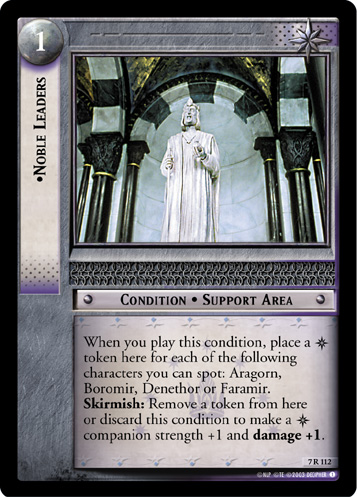 and Stewards’ Legacy (13U75)
and Stewards’ Legacy (13U75)
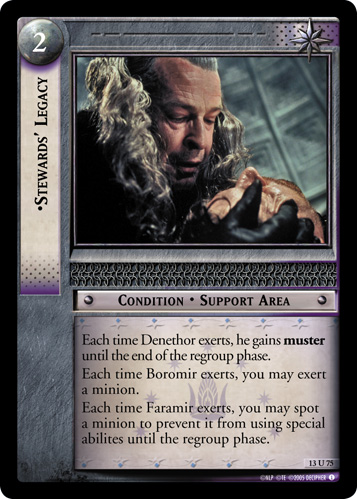 , and to top it all off he has unusually good base strength for his relatively low Twilight cost.
, and to top it all off he has unusually good base strength for his relatively low Twilight cost.
Denethor can only search your deck for cards at a Sanctuary and you generally want to filter out Free Peoples cards as quickly as possible. Because of this, his low Twilight cost, and relatively high strength, he's a strong candidate for your starting Fellowship. This usually means that you'll need to start with one of the Gondor alternate Ring-bearers plus a low-cost
Gondor companion. Depending on the format and the deck, Faramir, Captain of Gondor (4R116)
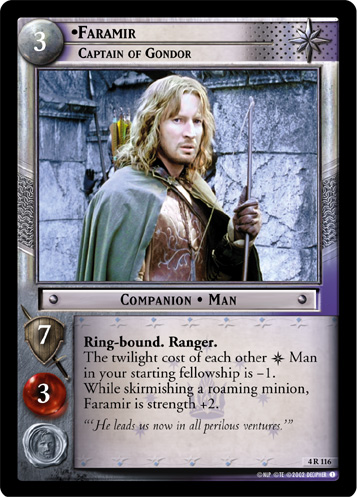 , Alcarin, Warrior of Lamedon (5R31)
, Alcarin, Warrior of Lamedon (5R31)
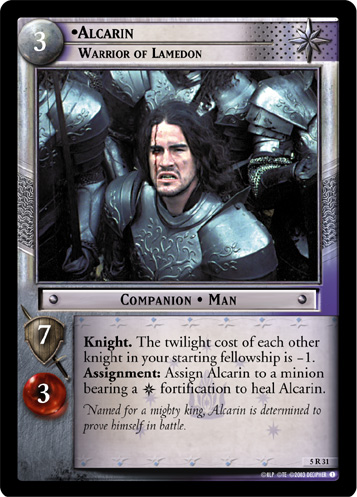 , Derufin (7R87)
, Derufin (7R87)
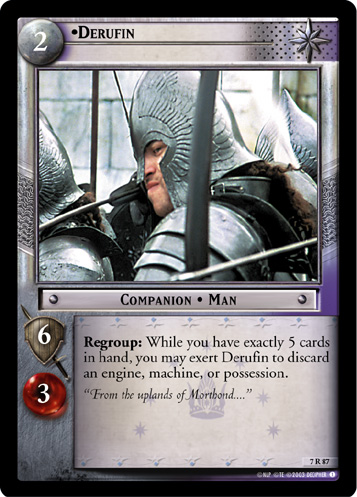 , Aragorn, Strider (11R54)
, Aragorn, Strider (11R54)
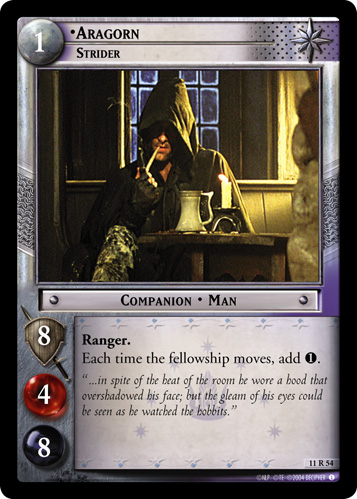 , and Faramir, Captain of Ithilien (18R48)
, and Faramir, Captain of Ithilien (18R48)
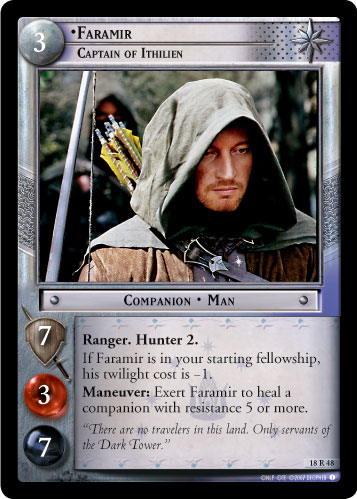 are all popular choices. If you do run Denethor in your starting Fellowship, don't worry about racking up a wound or two on him in the early skirmishes, since you'll almost always be able to heal him at the first Sanctuary.
are all popular choices. If you do run Denethor in your starting Fellowship, don't worry about racking up a wound or two on him in the early skirmishes, since you'll almost always be able to heal him at the first Sanctuary.
Once you have Denethor at the Sanctuary, exert him to tutor your key cards. Typical targets include conditions that are key to your strategy, like Stewards’ Legacy (13U75)
 or Sixth Level (8U44)
or Sixth Level (8U44)
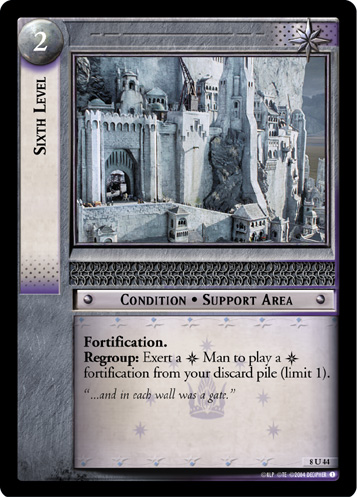 , key possessions like Aragorn’s Bow (1R90)
, key possessions like Aragorn’s Bow (1R90)
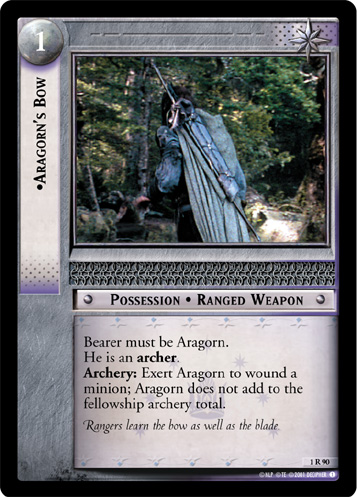 , Andúril, Flame of the West (7R79)
, Andúril, Flame of the West (7R79)
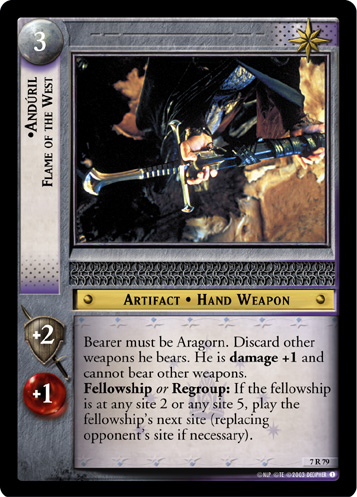 , Aragorn’s Bow, Ranger's Longbow (15R56)
, Aragorn’s Bow, Ranger's Longbow (15R56)
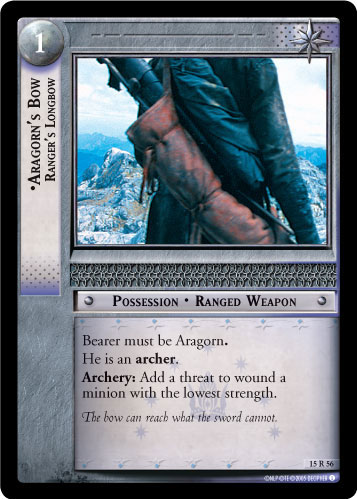 , or Ithilien Blade (15C62)
, or Ithilien Blade (15C62)
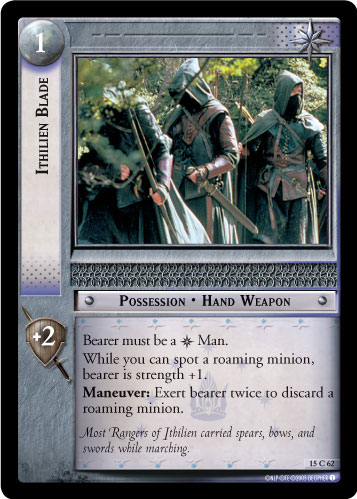 , or the owner of a Free Peoples possession that's clogging up your hand. Being able to smooth out the gaps in the cards you drew can go a long way in making your deck more consistent.
, or the owner of a Free Peoples possession that's clogging up your hand. Being able to smooth out the gaps in the cards you drew can go a long way in making your deck more consistent.
There are some tricks to get more than two cards out of him, however. Any healing that can be used anytime in the Fellowship Phase can allow him to tutor again: Beacon of Minas Tirith (7U338)
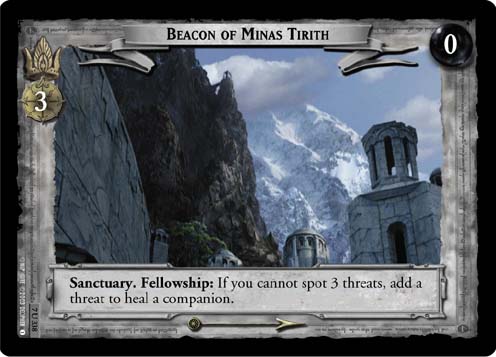 (in Movie Block) can heal him multiple times, for example. Any
(in Movie Block) can heal him multiple times, for example. Any Gondor card that heals a companion and has some other desirable effect (e.g. Aragorn, Elessar Telcontar (10R25)
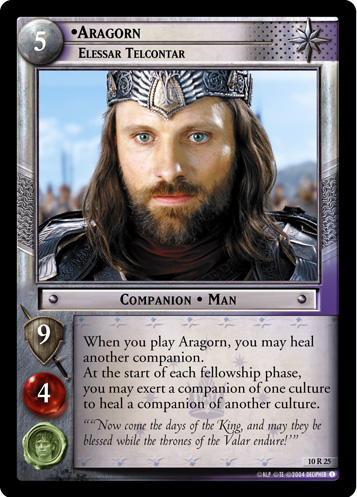 ) can be played for the latter effect "for free", because the healing can remove the exertion from Denethor. (Obviously, the Twilight cost is still a concern.) Any card that adds vitality to Denethor (e.g. Narsil, Blade of the Faithful (9R+34)
) can be played for the latter effect "for free", because the healing can remove the exertion from Denethor. (Obviously, the Twilight cost is still a concern.) Any card that adds vitality to Denethor (e.g. Narsil, Blade of the Faithful (9R+34)
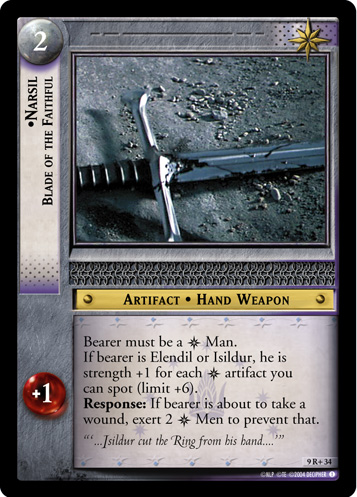 ) can be tutored and played on him, then that point of vitality can be used to search for another card. Transferring Narsil to another companion once Denethor has used that point of vitality will kill him, although that can occasionally be strategically useful if you want to stay under six companions for fear of Rule of 6 cards like Úlairë Enquëa, Lieutenant of Morgul (1U231)
) can be tutored and played on him, then that point of vitality can be used to search for another card. Transferring Narsil to another companion once Denethor has used that point of vitality will kill him, although that can occasionally be strategically useful if you want to stay under six companions for fear of Rule of 6 cards like Úlairë Enquëa, Lieutenant of Morgul (1U231)
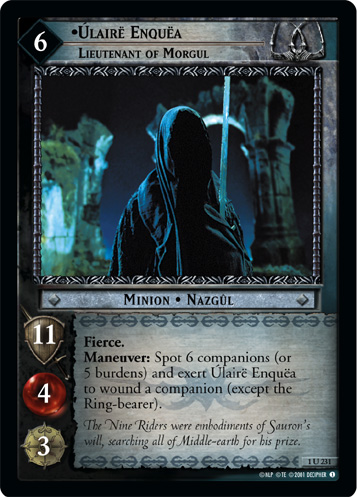 , or if you need to clear threats the hard way for some reason.
, or if you need to clear threats the hard way for some reason.
Denethor's ability to turn extra vitality and healing into more tutored cards can also be used to thin your deck with cards that just heal him or add more vitality to him. Even if you have Denethor in your starting Fellowship, you can add extra copies of him to your deck. At the first Sanctuary, you can exert him to search your deck for a copy of himself, then discard that extra copy to heal the exertion. If you draw the extra copy before the Sanctuary, you can just hold it in your hand for a turn or two to heal him at the Sanctuary for a free extra tutor. (This is similar to an old tactic with Elrond, Lord of Rivendell (1R40)
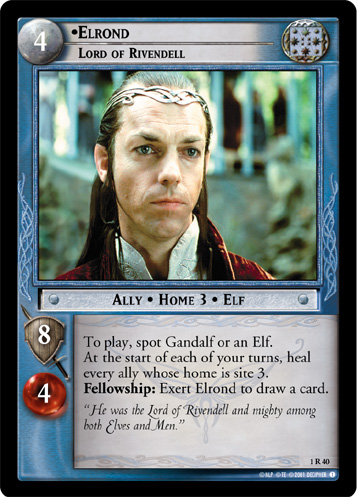 .) You can also do the same trick with The Saga of Elendil (1R114)
.) You can also do the same trick with The Saga of Elendil (1R114)
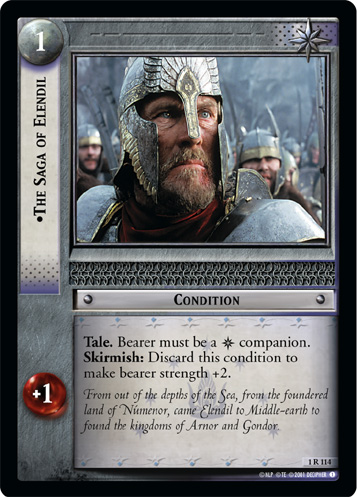 , to have another card to filter out of your deck. The main benefit of these strategies is reducing the size of your deck, although occasionally they also result in some extra useful uses of his tutor ability. Be careful when using these strategies, though, because no matter how much healing or vitality you pack on, Denethor is still subject to the Rule of 4, preventing you from tutoring more than four cards to your hand per turn. However, if you don't make sure you filter out all of these otherwise low-value cards, you might have some dead draws at site 7 and higher.
, to have another card to filter out of your deck. The main benefit of these strategies is reducing the size of your deck, although occasionally they also result in some extra useful uses of his tutor ability. Be careful when using these strategies, though, because no matter how much healing or vitality you pack on, Denethor is still subject to the Rule of 4, preventing you from tutoring more than four cards to your hand per turn. However, if you don't make sure you filter out all of these otherwise low-value cards, you might have some dead draws at site 7 and higher.
The main risk with Denethor is how much he gives away to your opponent. Each use of his ability draws two cards for your opponent. Combine this with the Twilight you likely generated by playing the cards you tutored, and you may be in for a very hard fight at site 4 or 5. Alternately, you may be helping out your opponent to set up their own Fellowship -- although this, in turn, can sometimes bait them into flooding. Make sure that the cards you're drawing are key to your strategy, or that thinning your deck is genuinely worth the risk.
Once you've used him to set up, Denethor is a respectable combatant in his own right, with an 8 strength 3 vitality body and access to strong generic Gondor Men effects. Decks using Noble Leaders (7R112)
 and/or Stewards’ Legacy (13U75)
and/or Stewards’ Legacy (13U75)
 can get reasonable mileage out of him as a backup to main combatants like Aragorn and Elendil, The Tall (9R+32)
can get reasonable mileage out of him as a backup to main combatants like Aragorn and Elendil, The Tall (9R+32)
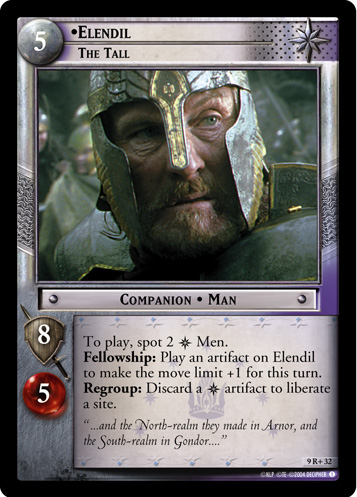 . (His best weapons are Knight's Spear (7C108)
. (His best weapons are Knight's Spear (7C108)
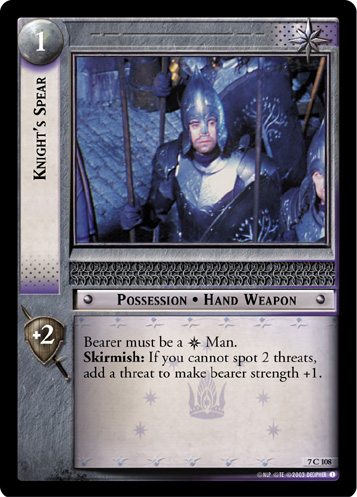 or Gondorian Sword (7U98)
or Gondorian Sword (7U98)
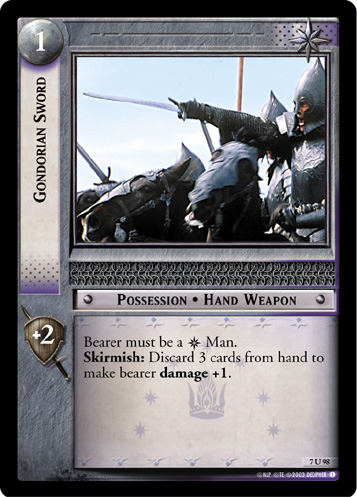 in Movie Block, and Ithilien Blade (15C62)
in Movie Block, and Ithilien Blade (15C62)
 in Expanded.) Other decks, particularly decks focusing on Knights or Rangers, can get some use out of his skirmishing ability, but often don't feel bad about using him up then throwing him away once he's been used to set up.
in Expanded.) Other decks, particularly decks focusing on Knights or Rangers, can get some use out of his skirmishing ability, but often don't feel bad about using him up then throwing him away once he's been used to set up.
Strengths and Weaknesses
Synergizes With...
Gondor cards that heal him in the Fellowship Phase or increase his vitality, like Beacon of Minas Tirith (7U338)
 or Narsil, Blade of the Faithful (9R+34)
or Narsil, Blade of the Faithful (9R+34)
 .
.- Noble Leaders (7R112)
 benefits from spotting him. He also can gain muster from Stewards’ Legacy (13U75)
benefits from spotting him. He also can gain muster from Stewards’ Legacy (13U75)
 , but that is by far the weakest part of that card.
, but that is by far the weakest part of that card. - More copies of himself, even if he's in your starting Fellowship, to thin your deck and occasionally get some free extra uses of his tutor ability.
Strong or Weak Versus...
- Denethor helps your deck set up faster and more reliably, while thinning the deck down. There aren't any significant Shadow strategies that he interacts with directly, for better or worse, except as a generic 8 strength skirmisher.
Rulings
- Remember that his tutor ability is subject to the Rule of 4. Only ever use it four or less times per turn, and try to avoid playing cards that draw extra cards on the same turn.
Alternate Personas
| Portrait | Name | Game Text |
|---|---|---|
Denethor, Steward of the City (7R85)
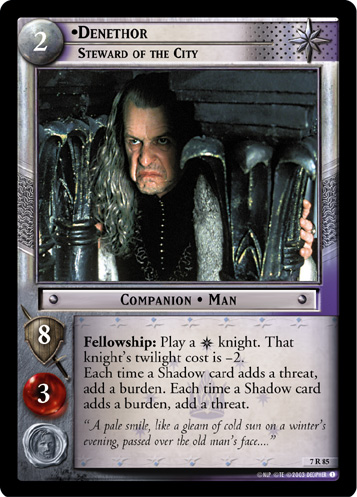
|
Fellowship: Play a Each time a Shadow card adds a threat, add a burden. Each time a Shadow card adds a burden, add a threat. | |
Denethor, Wizened Steward (7C86)
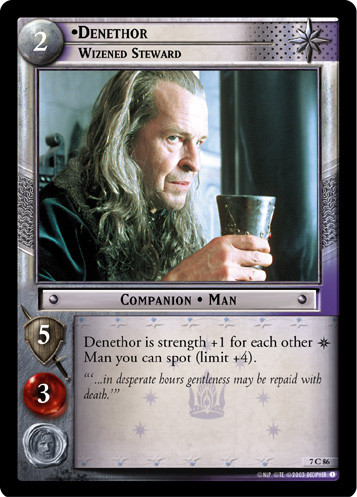
|
Denethor is strength +1 for each other | |
Denethor, Last Ruling Steward (13R64)
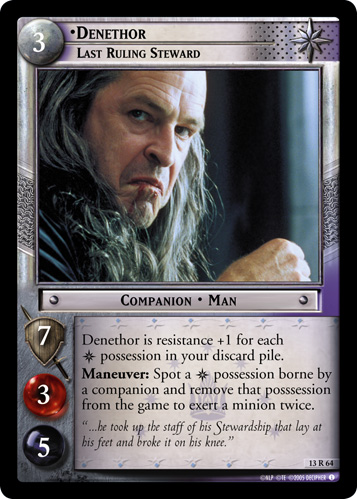
|
Denethor is resistance +1 for each Maneuver: Spot a | |
Denethor, On the Edge of Madness (18R42)
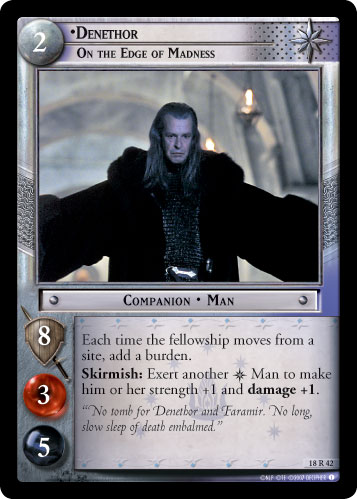
|
Each time the fellowship moves from a site, add a burden.
Skirmish: Exert another |






